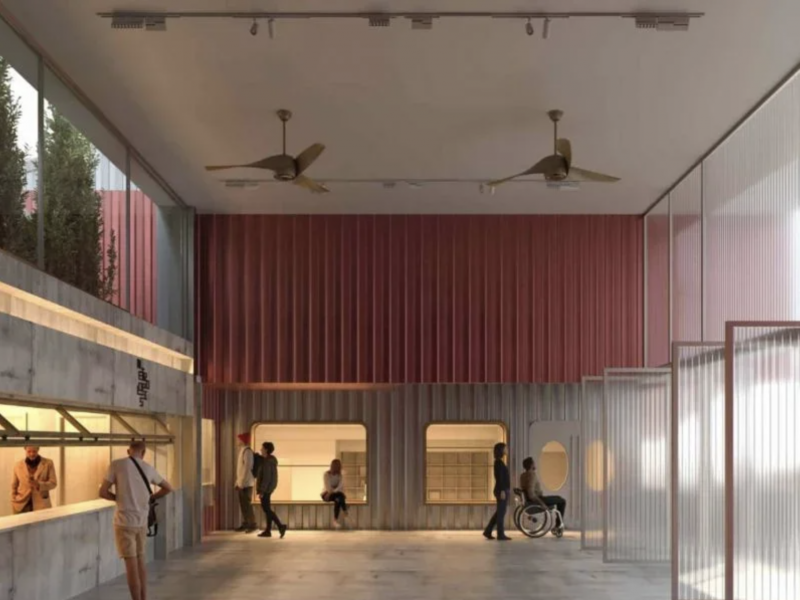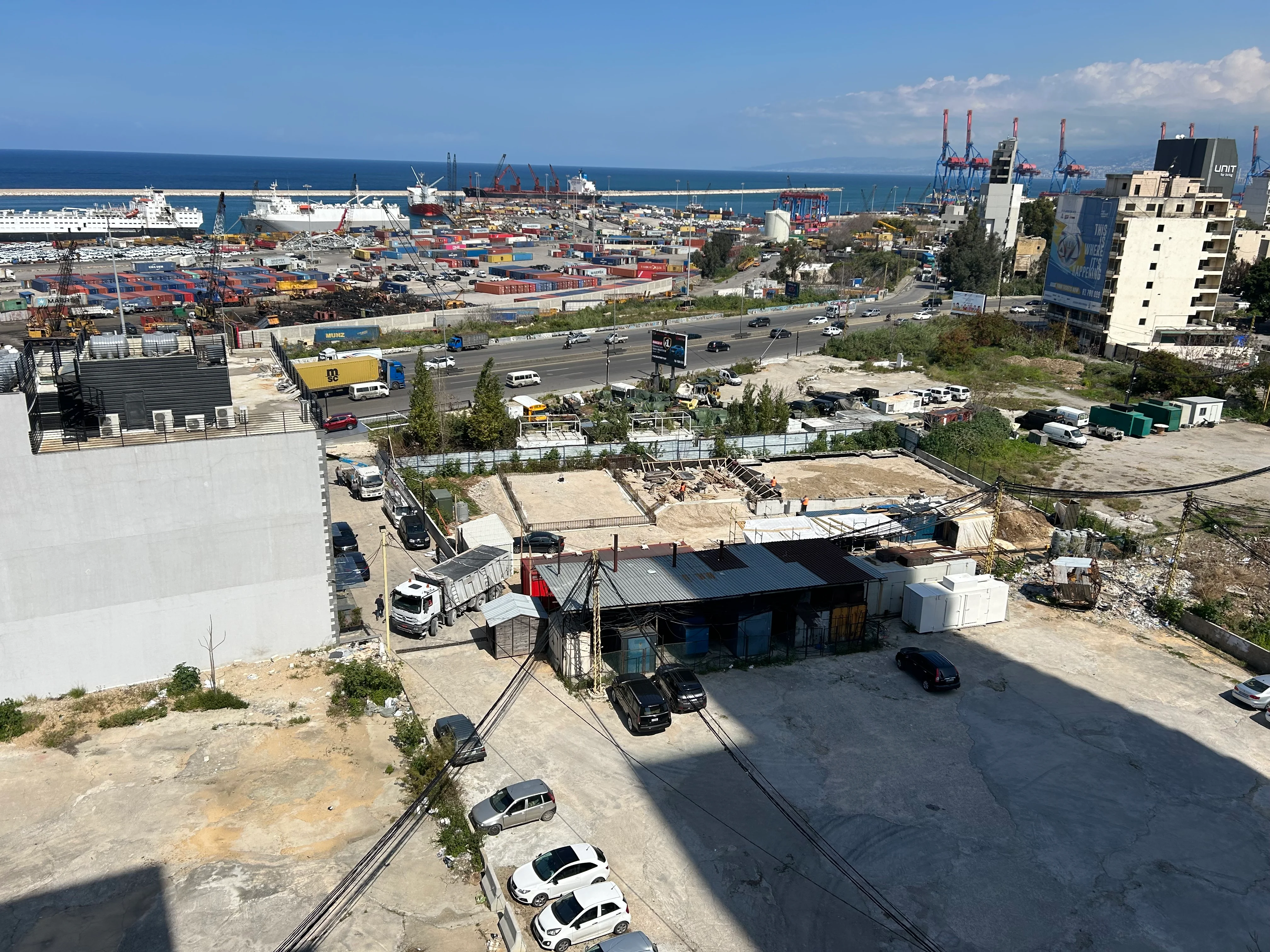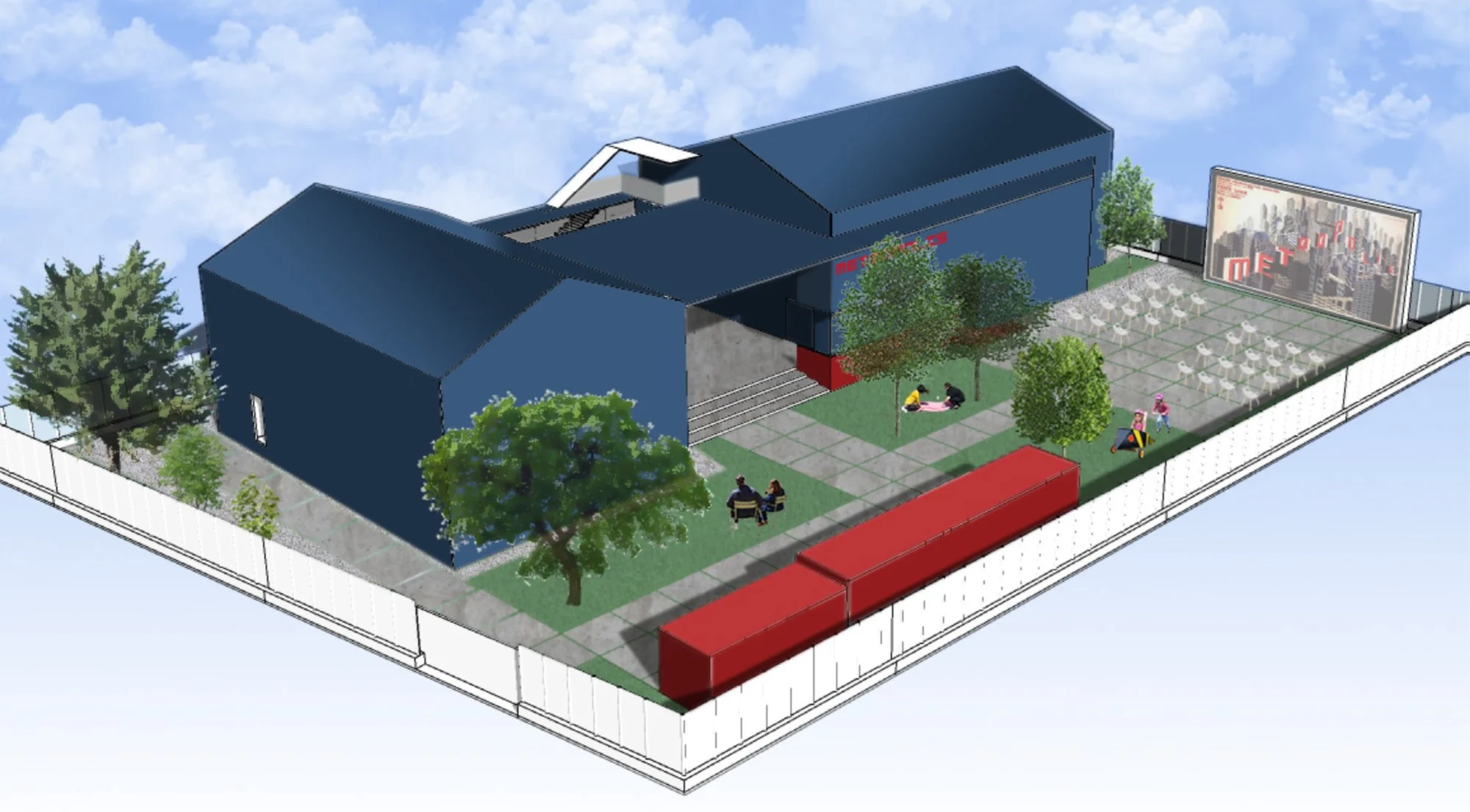
For its new halls, the Metropolis association relies on lightweight, removable structures. (Credit: Metropolis)
Thanks to a generous plot of land donated by Unifoncière S.A.L, the Metropolis Association is gearing up to unveil two cinemas alongside a film library. This initiative promises to invigorate the local and regional film industry and serves as a testament to the enduring power of culture.
In an exclusive interview with L’Orient-Le Jour, Hania Mroueh, co-founder of the Metropolis Association, and Zeina Sfeir, its president, shed light on the intricacies of this transformative project.
In the landscape of Lebanese cinema, Metropolis has always stood out as a unique entity. Since its inception in Hamra in 2006 — within the intimate confines of al-Madina’s small theatre until the closure of its two Sofil center venues in January 2020 — Metropolis has been the cherished haven for cinephiles.
The two Metropolis cinemas emerged as the pioneering regional hubs of art-house cinema, distinct from the mainstream commercial circuits that predominantly showcase blockbusters.
Their legacy is etched in the memory of cinema enthusiasts, marked by their diverse and vibrant programming. From hosting renowned festivals like the European Film Festival, the Écrans du réel documentary festival, Beirut Animated and the Youth Film Festival, to prestigious collaborations with Semaine de la critique, Arte and Les Cahiers du cinéma, Metropolis cultivated a cinematic landscape that was both enriching and eclectic.
Beyond its cinematic spaces, the Metropolis Association, co-founded by Hania Mroueh and chaired by Zeina Sfeir, has been on a mission since 2006.
They aim to champion and bolster independent Lebanese, Arab and international films, fostering a love for cinema among younger audiences through regular cycles.
They’ve established a rich and diverse program in collaboration with local and international partners while striving to make cinema accessible to all. They’re dedicated to giving the seventh art the prominence it deserves in Lebanon and the broader region.
 The project includes two movie theaters, one with around 100 seats, the other with a capacity of around 200, as well as a garden where 400 people can enjoy an open-air cinema. (Credit: Metropolis)
The project includes two movie theaters, one with around 100 seats, the other with a capacity of around 200, as well as a garden where 400 people can enjoy an open-air cinema. (Credit: Metropolis)
A crucial global initiative for the cinema
In addition to its vibrant evening screenings, the Metropolis had a bustling daytime scene.
“Many may not know this, but 25,000 students frequented our cinemas for retrospectives of esteemed Italian or French filmmakers, or to discover local cinema,” said Mroueh.
“We also hosted training workshops for budding talent, providing them with a stepping stone to enter the industry, whether in editing, sound, or distribution,” she added. “These initiatives were done in collaboration with the Berlin and Locarno festivals.”
The Metropolis film library plays a pivotal role in safeguarding the cinematic heritage.
“Through periodic retrospectives and archival efforts, we aim to preserve our cinematographic legacy,” Sfeir said.
Mroueh emphasized the association’s independence as a defining characteristic.
“We’ve always operated independently as a non-profit organization,” she said. “This autonomy has allowed us to curate the finest works of world cinema without being constrained by commercial viability.”
Despite the financial strains in sustaining an independent cinema — notwithstanding its niche and indie character —, Metropolis’s success and influence persisted and flourished over time.
“At the outset of the 2019 academic term, right before Lebanon’s social and economic crisis unfolded, we observed a steady influx of new, inquisitive and enthusiastic audiences to our theaters,” Mroueh said.
“This momentum spurred us to contemplate expansion and the prospect of launching a third cinema,” Sfeir added. She stressed that the sudden closure of Metropolis came as a real shock for both of them.
“In January 2020, we received the news that the venues had been sold, and we were instructed to vacate,” Sfeir said.
Amidst an unparalleled social and economic climate over the past four years, the Metropolis Association did not succumb to closure and persisted in its operations across Beirut and Lebanon. It “operated in ‘nomadic mode’, whether through outdoor screenings or partnerships with municipalities nationwide,” according to Sfeir.
“Nevertheless, the prospect of reopening our cinemas remained a constant project on our minds,” Mroueh said. “Initially, we scouted disused schools, abandoned cinemas and derelict factories. Then came the idea, deemed crazy by some, of constructing our own premises.”
 Opposite the port of Beirut, the Metropolis Association has started work on its new premises. (Credit: Metropolis)
Opposite the port of Beirut, the Metropolis Association has started work on its new premises. (Credit: Metropolis)
The Metropolis Cinema: Third iteration
Metropolis has discovered the perfect benefactors who recognize the significance and impact of cinema — now more critical than ever — in a period where many donors prioritize support for areas and disciplines deemed “urgent” or “essential.”
Unifoncière S.A.L. generously provided a plot of land in Beirut’s Mar Mikhael district, opposite the port of Beirut. The Metropolis Association started construction at the end of 2023 on a facility featuring two cinemas. One will accommodate approximately 100 seats, while the other will have a capacity of around 200. Additionally, a garden will be created where up to 400 individuals can partake in open-air cinema experiences.
There will also be a café and, most importantly, a comprehensive film library that will serve as “a resource center, housing over 3,000 cinema works, alongside the Metropolis film archives, notably the Lebanese film archives,” Mroueh said.
“This aspect of the project is crucial for us — it’s a way of preserving a part of our collective memory,” Sfeir added. “Even from an architectural perspective, sustainability was a priority.”
Mroueh explained, “That’s why we opted for a lightweight structure that can be disassembled if required, making it highly mobile.”
“In its third iteration, the new Metropolis will continue to host all its customary activities, now with a focus on South American, African, and Asian cinema,” Mroueh shared. “We’ve already finalized our program for the first year, and we’ll be kicking off our season with the resumption of the Écrans du réel documentary festival in September.”
“Additionally, there will be a significant emphasis on youth, featuring workshops and the Youth Film Festival, along with a dedicated section for Arab cinema, including a festival centered around this theme,” she added.
 A scale model of the new Metropolis at Mar Mikhael. (Credit: Metropolis)
A scale model of the new Metropolis at Mar Mikhael. (Credit: Metropolis)
Mroueh added, “We aim to reignite our partnerships with the Berlin and Locarno festivals and, due to public demand, revive the Semaine de la Critique.”
For those who may view this initiative as audacious, given Lebanon’s current state of decline and uncertain future, Sfeir said, “In these times of crisis, culture and cinema become even more vital and essential.”
“We refuse to resign to merely surviving from one conflict to the next. Just as local filmmakers persevere in producing their works, it is our duty to champion these creations, ensuring that Lebanese cinema not only gains international recognition but, more importantly, reaches its audience,” she added.
For Mroueh, “While we still need to secure 20 percent of the budget required for our new facilities, we at Metropolis remain confident that our call for donations will resonate with film enthusiasts and benefactors who recognize the significance of cinema.”
One thing is certain: For the Lebanese people, whose prospects may seem bleak, the reopening of Metropolis will serve as a beacon, revitalizing the nation and its cultural landscape.
This article was originally published in L'Orient-Le Jour. Translated by Sahar Ghoussoub.